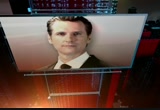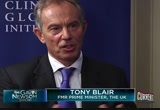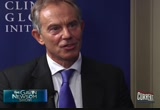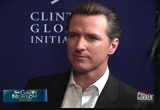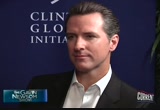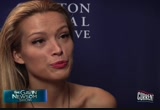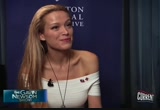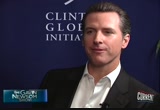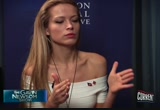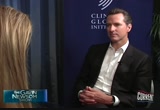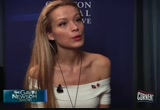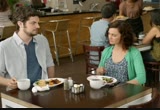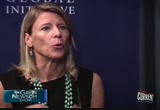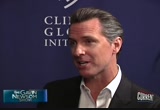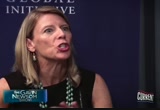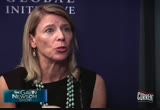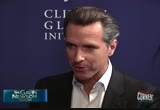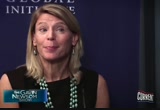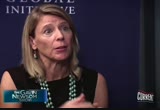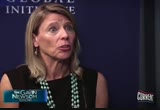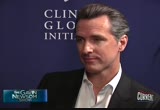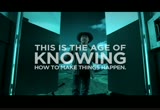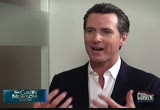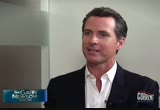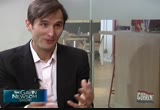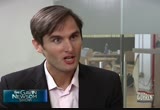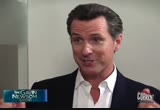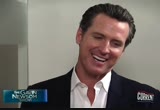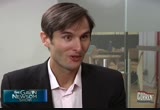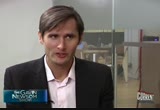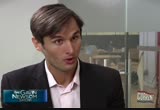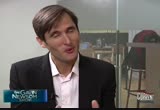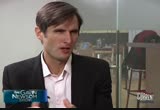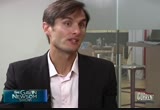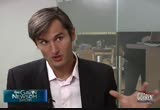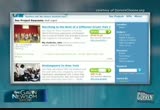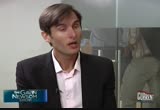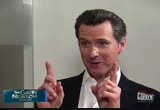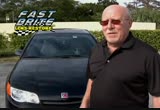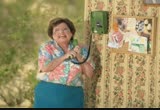tv The Gavin Newsom Show Current October 26, 2012 11:00pm-12:00am PDT
11:00 pm
>> gavin: hello and thanks for watching the show. with only 11 days to go before the general election, you're probably bombarded and sick and tired from politics, so we're taking a little break from the campaign coverage and look at folks who serve as role models here in the united states and abroad. there are four change makers, britain's former prime minister tony blair as he puts it, is much too young to consider retirement. he's traveling the world as a global politician and problem solver. then a young woman who survived disaster. she was a swimsuit model when she was caught in the 2004
11:01 pm
tsunami. and carolyn miles the ceo to save the children. she's no stranger to educating and feeding kids around the world. but you might be surprised to hear what she's doing to help poor children right here at home. and that brings us to charles best. he has come up with a brilliant way for people who want to donate money for specific projects and public schools. first tony blair why it's so important to continue working and keep an open mind. >> i think the big big battle of the world is between the open mind and the closed mind. the open mind looks at the problem and sees potential and culture and say that's interesting. then there are those who say this is a threat. i want to close it down, cordon off my community my own life, and i don't like this world. the battle between the open and
11:02 pm
closed mind, i see that all over the middle east. i see that in major parts of the world, even in the west. >> gavin: interesting. what--are there models where you have seen an evolution, a breaking of that consciousness that notion of that timidity of the world around them. are there examples? optimism. >> well, in different ways in a completely different context china when it began to open up it's policy, that's what delivered the powerhouse economy today. california the center of technological innovation. how did it happen? there is a spirit there about the open mind, about learning. you take a country like south korea, that in the early 60s had a g.d.p. the same as most african countries and today is first world.
11:03 pm
>> gavin: what is foundation what is the most exciting that you're working on? what is are you passionate about. >> the most difficult, and most exciting for me, i have two foundations. one in africa where we work along side the governments of africa to deliver change to the people in seven different african countries. called the big footprint and then an organization of religious and cultural exchange where we work in some of the most difficult countries in the world where people are educated in the way they think and look at each other. >> gavin: you're not just bringing in resources you're using your own human resource to get involved, hands on, i imagine. >> i raise money for my foundation. i gave my own money to them and i go out to 20 different countries. it's a political after life. not for you governor, yet at any rate. >> gavin: great to see you. >> yes, thank you.
11:04 pm
>> gavin: thank you. >> gavin: understandably you might think it a bit of a stretch to segue from former head of state to a supermodel, but petra nemcova's story is worth your time. she was injured in thailand when the 2004 tsunami hit. her fiancé was tragically killed but petra survived, and it was a life-changing experience. she started the "happy hearts foundation." >> coming back from thailand, after i could walk again i found my sister and we went to see how we could help. visiting hospitals cheryls temporary schools and learning what are the needs and what are the most impactful solutions for the long term. and understanding that school is such a center of a community. when you've rebuilt safe
11:05 pm
schools, it helps healing from the trauma for the children. it gives them educational opportunities so they can get better jobs and employment. through that they can help their own family. while children are safe at school parents can start working to feed the children. because school is such the center of the community, it's a community center. all the houses are still damaged, it gives the community help to rebuild and they can do it. so the impact is on the children families, community and multi generational. and it's been--we chose to focus on education and safe sustainable schools, to be able to have the biggest impact. it's about impact. >> gavin: tell me, exceeded expectations? seven years later foundation has grown and grown and impacted how many lives now? >> we started the foundation
11:06 pm
in 2005. and started in 2006 officially. in less than six years we have impacted 40,000 children and 337,000 community members. we just opened our 56th school. in the next two months we're opening five more. it's been really an amazeing journey. all that is really through partnerships. and it's all about smart partnerships. through our partnerships we've been able to rebuild many schools and effect main lives. >> gavin: who are your key partners. >> we have a new partner and really they stepped up on many levels matching us 50% comes from us, 50% from them. but their employees get involved in such an incredible way working with the community. the intellectual property, they give so much of themselves.
11:07 pm
when we come to the communities the employees of our partner they come with presence saying thank you for giving us the opportunity to help with this community. for me they are example partners. i wish there were more partners like that because on a multi level way they really embraced it and absolutely love it. when we open our school in mexico at the end of august theretheywere literally crying because of how much it means to them, the employees of our partner. >> gavin: so the schools are not just in thailand, you have been in mexico. where else. >> we're focusing right now on six countries which were impacted by natural disasters. thailand, indonesia, mexico, chile, and haiti. >> gavin: you're now ambassador. what is your new title to haiti. >> ambassador at large for haiti, which is a great honor because i absolutely the people
11:08 pm
of haiti. the first time i went was in in 2007. we started our work there and i think the potential in the people is beyond incredible. they never got the opportunity. haitians can have an inch of opportunity, they'll run with it. and my goal is to give them the opportunity through job creation or education. the potential is there. >> gavin: so, i mean, remarkable shift. your life is going in one path. through tragedy seemingly in a completely different path. did you ever expect--this notion of fill plan philanthropy social justice or did you discover it after 2004. >> it was inside of me.
11:09 pm
after the 2004 tsunami i knew my goal in life was to help children through education. before that i thought it would be impossible. i barely speak english how am i going to do that. and then obviously the 2004 tsunami speed up the process and create opportunities to implement the goals to provide betterrational opportunities for children. >> gavin: where do you expect to be five or ten years from now? do you have ambitious goals? is this a trajectory you don't want to stand in the way and you want to see where this thing could grow. >> happy hearts would like to see at least 100 schools opening, which is very achievable, and i think there is focusing on the impact really, the designing for impact that something that we should ask
11:10 pm
ourselves every day, and so very inspired by the opening session and really finding smart ways how to rethink our strategies can be so impactful. so i will do that after this also. but in making the goal is to--because we are focusing on education from happy hearts, and one of the goals--and they come in we come in when it's not attractive to come in. we come in, and we stay this. we rebuild the schools it's their school. they take ownership of it. they're participants in the rebuilding. we don't just give them, secure
11:11 pm
the land, it's theirs. i would like to find a way--one of my goals is to find communication between first responders and the government so the gap which is one to ten years can be narrowed down to one or two years where children and communities are forgotten. right now we come into countries five or seven years later and they're still in temporary schools that was supposed to be this for one year. that's the kind of communication and partnership on those levels, i would love to see happening more. and then on the vertical level focus on education and find great partners in health and vocational training so we can provide a more wholesome opportunities for children's future. >> gavin: from your perspective haiti, how far along is the re recovery. you go back frustrateed, why
11:12 pm
isn't this moving faster? or do you come back inspired because you see real progress. >> i come inspired. just in 2011 and 2012 there are 329 schools rebuilt. there has been this year there will be 1 million children getting school meals. it's 15% more than last year. and it's--you see the increase, 90% more children are going to school in 2012 and '13 so you really see the progress. it's there. it's not often visible because its spread out throughout the whole country and the country before the earthquake needed help on every--in every industry on every level. but you see it. you see schools you see hospitals. you see new businesses coming and they are building.
11:13 pm
there are great opportunities with manufacturing, companies coming in, and president clinton has been incredible, a voice for haiti. you do see change. actually now there reduced amount of people in the tents to 200,000 only knew now. it is a big number, but it has reduced. it is getting better. there is a change happening and very important there is a stable government. with the stable government you can create a change. president martelli, they have been so focused on goals on creating results, and they are there for their people. i have seen it firsthand so i am really a believe center haiti being able to turn the corner and create a new haiti happy haiti. >> gavin: happy haiti. is that the key to success in all of these countries that
11:14 pm
partnership with local government and obviously national government? has that been the strength in the partnerships with thailand, or is that a point of concern. >> from the happy hearts standpoint we work with corporations n.g.o.s governments. but mainly it has been a case, in haiti on the part of big government. i think every country is slightly different. sometimes you are able to be faster without the governmental interaction. in haiti you have to work with the government to get things done. so i think you have to take it case by case, and alter it tailor it for the scenario. there the government is there for the people, and they want to create a change together partner, and have the same goals. of course, i'm always for any
11:15 pm
smart nerships. >> gavin: it's great to have you this. >> gavin: established in 199 save the children has been around for almost 19 years. it's largely seen as a global non-profit. after the break see why the organization is turning to problems here at home. you really cant' dvr the future of the country. to help you make informed decisions, watch current tv's politically direct lineup. only on current tv. so vote and vote smart. [ male announcer ] red lobster's hitting the streets to tell real people about our new 15 under
11:16 pm
$15 menu. oh my goodness! oh my gosh this looks amazing! that's a good deal! [ man ] wow! it is so good! [ male announcer ] our new maine stays! 15 entrees under $15 seafood, chicken and more! oo! the tilapia with roasted vegetables! i'm actually looking at the wood grilled chicken with portobello wine sauce. you so fascinated by the prices, you keep rambling on! i know! -that pork chop was great! -no more fast food friday's! so we gotta go! we're going to go to red lobster. yep. [ male announcer ] try our 15 under $15 menu and sea food differently! then how'd i get this... [ voice of dennis ] ...allstate safe driving bonus check? what is that? so weird, right? my agent, tom, said... [ voice of dennis ] ...only allstate sends you a bonus check for every six months you're accident-free... ...but i'm a woman. maybe it's a misprint. does it look like a misprint? ok. what i was trying... [ voice of dennis ] silence. ♪ ♪ ask an allstate agent about the safe driving bonus check. are you in good hands?
11:17 pm
11:18 pm
ideas are the best politics. [ ♪ theme music ♪ ] >> gavin: one of the most pressing and probably long-term damaging problems for low-income children in this country is malnutrition, leading to childhood obesity. that's a key challenge facing carolyn miles president and ceo of save the children. >> save the children focuses on two areas, health and making sure that children survive the age of five, that's a huge objective to us, and then education. children getting through basic education with the skills they need. >> gavin: before we talk education, on the health side, five, why is that a magical number? or was it just a number that sort of median age in some
11:19 pm
respects for those that are suffering certain chronic conditions? >> yeah, the reason why five is so critical the vast majority of preventive deaths, things you can prevent occur before the age of five. right now six 6 million to 7 million children guy of preventable things, most of them in the developing world. that under five is critical. these kids are dying of stuff like diarrhea, pneumonia things that our children would never die of. they're really preventable, and that's why the focus on under five. >> gavin: what is the driving success as much what is it that you do that makes the organization work so well and scale so many different places. >> i think what makes save the children is so successful, we work on the ground. we actually do the work. we do the programs. we train the health workers. we work with mothers. we distribute antibiotics. we do all of those things on the
11:20 pm
grounded. then what we do is try to scale that up by working with other partners, working with governments in those countries. in a place like ethiopia we would be working closely with the government of the ethiopia, the minister of health. to take those things that we've learned that actually save lives with kids and replicate them and replicate them so you're saving millions of children. >> gavin: is that replication more challenging moving from--even within certain countries, dealing with different factions etc. how is the ability to scale impacted by those issues? >> well, it really is, i think so often all about culture. i'll give a great example. when we work in nepal we're really working against a culture that thinks that when you have a baby, it's a very dirty thing. the woman has her baby in the stables. this is the tradition. the tradition is go to the dirtiest place and that's where you should have the baby. of course from a stand point of
11:21 pm
health for the mother and child that's the worst place you could have a baby. we are really working at changing that culture. in the case of nepal, what we've done is appeal to the mother-in-laws. the mother-in-laws are the ones who control things as to how that birth is going to go. we talk to them this them about the health of their grandchildren, and of course they want healthy grandchildren. then we teach them why it is so important to give birth in a clean place clean sheets. that's one example and every country has something a little bit different about the cultural traditions. you really have to work at the community level of people who live there and understand. a lot of our staff are from these communities. they know the culture, the tradition, and try to change those from within. >> gavin: in the united states, most your efforts on the health side are where? >> we actually work in two big areas. health and education in the u.s. in the united states it's all
11:22 pm
along the southern part of the united states. and it's really in the poorest communities primarily rural communities. on the health side, the big issue in the u.s. is childhood obesity. we work a lot in that area. >> gavin: in what ways? prevention and education side, working with local municipalities to enact legislation? what respects? >> all of those. but our work starts actually we work in school in a lot of cases. and we're starting with nutrition education providing healthy snacks to kids after schools, doing physical activities program after school, and educating teachers and parents about the importance of nutrition. so that's one big piece. then this whole piece about legislation, and what is it that schools particularly can do to be healthy. what are the things that they can do. >> gavin: salad bars, and removing soda.
11:23 pm
>> exactly. healthy lunches and what kids are served during lunches. the first program we ever did in the united states was during the depression in 1932 in appalachia, and it was the precursor to the school feeding program. and so now we're going back to our roots of school lunches and. >> gavin: speaking of going back to one's roots early childhood education, preparing to enter the k through 12 system. critical focus to save the children? >> critical focus. what we found is just a year of preschool makes a huge difference. 25% more enrollment for those kids in getting into primary school and staying. >> gavin: that's a broad stat that transcends particular countries. >> it's an overall statistic and in some countries its even higher. getting kids into one year of preschool, even if it's an
11:24 pm
informal preschool under a tree with a volunteer we've taught and trained in that community, it makes a difference. kids are ready for school. they have an idea of what school is about. they have learned basic things. they have learned to social eyes with other kids. very similar to what we see in the united states, what preschool is all about. it has demonstrated over and over again the impact of kids' ability to learn in primary school. >> we've talked about education in the united states. >> we're working about it in the u.s. >> gavin: what about the consciousness about education. is there a stronger consciousness? or is it country by country. >> it is country by country but it is changing. there is a body of science behind this in terms of brain development. if you're not stimulating kids in those early years, and they're not getting the early stimulation they need, we know that their brain does not
11:25 pm
develop the same way as if they were. that's the same. that's when you have a child in malawi or in california. it's exactly the same science. we're trying to use that science in really pushing for early childhood. and then showing again, programs on the ground that actually demonstrate the effectiveness. in the u.s. we do a lot of early childhood preschool. we then test the kids. we do testing with the children to see where they are in terms of their capabilities. >> cenk: why >> gavin: why haven't we with all that evidence that you point to, we know the best investment the best return is on the front end, not the remedial side. what is it about our educational system or perhaps more importantly our leadership in this country that hasn't started to adjust those dollars or enhance those dollars in the
11:26 pm
investment. >> that is changing but most people think of preschool as a luxury. they think it's for middle class or wealthy kids. it's a luxury that kids can stay at home. and it's just isn't the case. i was in arkansas last week, and he visited the pre- preschool programs there. and we asked many moms what would your children be doing if they weren't at preschool. they said they would be sitting at home, watching television. sometimes by themselves. if their mothers are working and they can't afford child care, it's not a luxury. it's a necessity in terms of these kids being able to advance and compete and particularly if we're talking about a world economy they need that start in life. >> gavin: what is too early. and is there such a thing as too early. i have a three-year-old, and we've been in preschool for a year. and that was news to me at two that's what i would call pre-preschool. >> they say in terms of brain
11:27 pm
development by the age of two your brain would be developed 65% or so. again those early years. we started moving into home visiting in the united states. so we are actually doing home visits in that 0 to 2 age groups now to help moms--to empower mothers, help them understand, what do kids need. what can they do to stimulate their children, learning, bringing books in the homes. and in poorhouse there is are no books. bringing books in the homes and understanding why it's important to read to their children. we think zero is the right place. >> gavin: i love it. thank you so much for talking to me. >> you are welcome. >> gavin: thank you. >> thank you. >> gavin: coming up, find out what one entrepreneurial schoolteacher is doing to find funding for classroom projects in all 50 states.
11:28 pm
where you don't back down from a challenge. this is the age of knowing how to make things happen. so, why let erectile dysfunction get in your way? talk to your doctor about viagra. 20 million men already have. ask your doctor if your heart is healthy enough for sex. do not take viagra if you take nitrates for chest pain; it may cause an unsafe drop in blood pressure. side effects include headache, flushing upset stomach, and abnormal vision. to avoid long-term injury, seek immediate medical help for an erection lasting more than four hours. stop taking viagra and call your doctor right away if you experience a sudden decrease or loss in vision or hearing. this is the age of taking action. viagra. talk to your doctor.
11:31 pm
>> gavin: ever since he came up with the idea of donors choosing to fund whatever classroom projects they like i've been a huge fan much charles best. his students in his new york city classroom ran short of supplies. so he set up a website and changed forever how people can get involved in funding public schools. >> gavin: everyone who knows me knows what a big fan i am of donor's choose. and for those who could not know donor choose.org and know what you are about give us a quick overview of what donors choose. >> i was a history teacher at a high school in the bronx for five years. i saw thigh students go without the materials and experiences that they needed for a good education, and with the help of those same students i created this website donor as choose.org , which is a simple way for anyone to help a classroom in need. public school teachers all across the country post
11:32 pm
classroom project requests, and then donors can choose the project they want to support see how their dollars are being spent and see the impact in photographs and thank you letters that the classroom sends them. >> this is an important point. if you make a contribution to donor's choose, you know you've made it directly because the classroom itself it photographed or the item being delivered whatever you've supported and you get a real sense and a real connection, and those thank you letters are profound. is that an idea that you originally started with and you said that's the different differentiator, rather than accepting it to a charity who says trust us, it will get to where it needs to go. >> it was part of our model from day one. the question was would children write genuine thank you notes to strangers who effectively now given them more home work because they now have the dictionaries that their
11:33 pm
classrooms needed. but it turns out that students would write incredibly heartfelt, genuine funny raw thank you notes. >> gavin: and this was expected when you saw that contribution, that you're going to see the physical evidence of connection. as a consequence, how many people re-up. i would imagine the impact of receiving the thank you receiving the physical evidence or photographic evidence, it must make people want to do it more. >> we hope that does happen. 800,000 people, we call them citizen philanthropists who have supported classroom projects on our site. it's a win when that the donor gets the photograph, the impact letter describing the student learning taking place as well as the thank you notes they reup. >> gavin: with the 800,000, they are not duplicated. are they dispersed throughout
11:34 pm
the united states? is this all in 50 states or do you see a concentration in urban centers on the east coast and west coast. >> more dispersed than you would think. our site is really for the $10 choice who gets the same transparency as the $1 million gift. we track people from all walks of life. >> gavin: what is the typical profile of a donor. >> typical profile the majority of our donors are women. they range in age. regardless of gender, there are people who don't want the typical passive check-writing experience of being hit with a plea maybe a photograph that makes you want to cry, and you put the check in the mail and you trust the institution to do with awhat's right. that's an appropriate model in a lot of cases but we created a model where the fill philanthropic
11:35 pm
donors. they can go to the town they grew up, requesting books written by their favorite author match their personality and feel like a philanthropist. >> cenk: what is a typical match? is it a film projector? now everyone wants the latest ipad iphone for their classroom? i imagine you have a trendline of ten most popular. >> that's right. average project is $500. books would be a classic request. just within the field of technology interestingly more popular than a laptop, a smart board, an ipad is a document camera, which is kind of the next generation overhead projector where there is a
11:36 pm
square of glass and anything that the teacher is doing with her hands is projected large on a classroom wall. you could be reading a book with fine print and put your finger under each word, the way you would read to your three-year-old and then imagine it being projected large on the wall. number one item. >> gavin: what are things that surprisingly don't generate interest. the old pencil sets. people say that's not enough. i want to do something more. pads of paper. those surprisingly things that you wonder why it's just sitting there and we're not getting the 800,000 attention. >> there is a critical mass of donors who feel touch screen tablet are new fangle, and they
11:37 pm
support requesting construction paper and pencils before before the touch screen tablets. there are donors who see the potential of that technology, but there is a split and it makes more expensive technology projects a little bit less likely to be fully funded. >> gavin: most expensive thing ever supported? >> the range--i think of one when we were still operating donors out of my classroom in the bronx, and my students were our staff members. there was another teacher in the bronx, a first grade teacher whose students could not go out for recess because the playground was in such disrepair disrepair. she asked a new playground. a pre-fab--pre-constructioned playground. we never thought it would happen, but we posted it, and donors fully funded the new playground. >> gavin: you and i have had
11:38 pm
these off-line conversation where people stepped up in major ways where someone in a state said i want every project on the side. this are couples coming together with $20,000 contributions or writing a bigger check and say can you choose where i should put my money? >> that's exactly--the most surprising and heartwarming happened in your home state when a woman left a voice mail for me. i thought she was having trouble making a $10 donation. i called her back and she said, how many classroom projects are there in california. there were 2200 classroom projects in california at the time. she said how much would it cost to fundamental all. i calculated it. $1.1 million. we hung up and i assumed we would never hear from her again. and then i received a check for $1.1 million to fund every teacher in california on the first day back to school.
11:39 pm
>> gavin: we'll take a break but when we come back more with charles best. and why team were foos to go fund therapy dogs. to you. to help you make informed decisions, watch current tv's politically direct lineup. only on current tv. vote smart. our democracy depends on an informed electorate. what we need are people prepared for the careers of our new economy. by 2025 we could have 20 million jobs without enough college graduates to fill them. that's why at devry university we're teaming up with companies like cisco to help make sure everyone is ready with the know-how we need for a new tomorrow. [ male announcer ] make sure america's ready. make sure you're ready. at devry.edu/knowhow. ♪ ♪
11:40 pm
cook what you love and save your money. joe doesn't know it yet, but he'll work his way up from busser to waiter to chef before opening a restaurant specializing in fish and game from the great northwest. he'll start investing early, he'll find some good people to help guide him, and he'll set money aside from his first day of work to his last, which isn't rocket science. it's just common sense. from td ameritrade.
11:42 pm
>>there's not a problem that exists in america today that hasn't been solved by somebody somewhere. >>(narrator) share your views with gavin at politicallydirect.com, a direct line to the gavin newsom show. >>focus on the folks that are making a difference, that are not just dreamers, but doers. >>(narrator) join the conversation. [ ♪ theme music ♪ ] >> eliot: we're back with donors choose founder charles best. he has some insights not just on
11:43 pm
the phenomenal growth in funding but the unusually trends in donations. >> it's not just the actual physical book or classroom equipment, but it's the experience, field trips, i imagine, things like that. what are all the things that have been matched have been the most interesting or exotic from your perspective boy, i never thought i would see that. >> therethis is something that we're seeing trending right now. the mini trend is classroom projects on donor choose.org that center on therapy dogs. teachers have discovered special needs kids, many whom are apprehensive about reading out loud. they don't want to be called up to a class and be exposed where they might not be able to read a word. with you when they kids read to a therapy dog a non-judgmental
11:44 pm
listener these kids love to read. all they want to do is read out loud and orate to these therapy dog. there are 35 projects on our site just dealing with therapy dogs. >> gavin: how much money has been funded. >> over $45 million. >> gavin: so every state in this nation has probably one or more projects? >> oh, a whole lot more than one. we went national in 2007, and we did a soft launch. we didn't tell anybody that our site was open to all the public schools across the country and in six weeks every single state in the union had at least one teacher posting a strong. >> gavin: are you surprised? 40% is incredible penetration. are you wondering why more haven't? why wouldn't they try. are there those who are not yet
11:45 pm
converted and can't believe there is not something else up here some corporate takeover and there wouldn't be a new logo in the classroom. >> we do have more teachers to convince to try out the site. maybe that's 5%, 10% teachers have posted projects on our site although half of the public schools have at least one school school. how often the hang up on the part of the teacher the feeling that they've never written a grant application before, and they worry if they could create a project or our site. what they don't appreciate is that donors on the site are citizen philanthropists. they want to look at plain spoken ideas teachers have to help children learn. that's all that any dedicated teacher can do. >> gavin: if you have critic, and i don't know if there are i'm being sincere in asking,
11:46 pm
what with they say? is this a way of supplementing public school, and we should be fighting for more funding dollars. >> two criticisms, one we got when operating out of my classroom and people didn't know what to think of us. this came from the school superintendent. that was a worry that teachers would use donor's choose.org that teachers would try to get books that had not been approved or deviate from books. 200,000 funded classroom later there have not been projects that a school superintendent thinks are terrible. the second criticism is from people who understand ply at first blush worry that donors choose.org is letting private citizens letting government off the hook. what we instead see, people who
11:47 pm
give to projects on our site, 70% had never given to public schools. 67% say the experience on our site made them more energized more riled up about systemic improvement than before they had visited our site. giving to a classroom project was their first encounter with classroom needs on the other side of the track. they came out of that energized to demand change. we're also taking the data generated by 800,000 people supporting classroom projects posted by 250,000 teachers, opening it up so people can make discoveries that might make government education spending smarter, targeted, more efficient. >> gavin: what does it all include? are you finding others entering the space and providing not completely dissimilar initiatives along the line of donor's choose. >> back in the year 2000
11:48 pm
donating to a charity by the web was pretty new. now we have--there are a range of kindred spirit organizations out there, i feel peer to peer funding has become a movement. >> gavin: this is what you describe peer to peer. is it an idea that it's direct, we're not going through someone else. we're going direct to the source to solve the problem. >> you said it best. other people would call it micro giving other a social marketplace, or social benefit marketplace, but peer to peer funding captureed it with one to one giving. >> and the fab work that they're doing. >> kick starter for-profit, but peer to peer every much. >> anybody else on the education space that has jumped in. >> there is a range of sites where you can support schools and teachers, but it's really just donors choose.org .
11:49 pm
>> how do you funds this? you're not taking a percentage. how do you operate donor's choose. >> when it comes to supporting our operation as our name suggests, we let donors choose. let's say that you choose a classroom project in sacramento that focuses on shakespeare. you decide to give $10 in that project. during the checkout we encourage you but not require you to allocate 15% or in this case $1.50 to support our organization. 3% of donors keep that allocation that is included. now we're a break-enfully funded charity. >> you have a full board including stephen colbert. >> he has done a wonderful
11:50 pm
things for our organization. we have a couple of people to thank for getting him interested in our organization. one, a senior editor of "newsweek," and then co-founder of craigslist. in an interview he talked two minutes about craigslist and the rest of his interview was about donors choose.org , we owe hip a lot. >> gavin: that gift of giving is a gift card that you can provide someone to engage in donors choose. thank you for being on the show. >> thank you so much. >> gavin: from head of the classroom to heads of state. coming up i'll have my thoughts on tonight's guests and why we need to keep our focus on long-term issues despite being caught up in the presidential race. they can bundle all your policies together. lot of paperwork. actually...
11:51 pm
[ dennis' voice ] an allstate agent can help do the switching and paperwork for you. well, it probably costs a lot. [ dennis' voice ] allstate can save you up to 30% more when you bundle. well, his dog's stupid. [ dennis' voice ] poodles are one of the world's smartest breeds. ♪ ♪ bundle and save with an allstate agent. are you in good hands?
11:54 pm
[ ♪ theme music ♪ ] >> gavin: here's a compliment about american culture. when we focus on a problem at hand we can move mountains whether its raising funds for an international disaster like the the 2004 tsunami or grassroots efforts like the occupy movement. the movement of people can bring change. now criticism that same energy and same focus can be finicky short-lived or distracted. when headlines lose our attention we forget about things that matter most. that's why i'm in the news barrage of obama versus romney, my guests are taking on serious issues that require and deserve our full attention no matter who is in office in the next four years. tony blair is no longer on the front pages of the times or the guardian but his reprieve from
11:55 pm
politics has allowed him to deinvite most of his time to issues he cares about. supermodel petra nemcova's influence is different than blaresblairs but she's still leverages that influence. and carolyn miles works against things that only get worse child obesity. figuring out ways to figure out solutions to long-term problems, charles best, that's in the classroom. as lieutenant governor, after the elections are over, we need to refocus our attention on the kinds of long-standing issues illustrated by my guests. issues that may not make for shocking headlines but are usually much more deserving of our attention and our support. thanks for your attention tonight and anker please
11:56 pm
11:57 pm
11:58 pm
229 Views
IN COLLECTIONS
CURRENT Television Archive
Television Archive  Television Archive News Search Service
Television Archive News Search Service 
Uploaded by TV Archive on

 Live Music Archive
Live Music Archive Librivox Free Audio
Librivox Free Audio Metropolitan Museum
Metropolitan Museum Cleveland Museum of Art
Cleveland Museum of Art Internet Arcade
Internet Arcade Console Living Room
Console Living Room Books to Borrow
Books to Borrow Open Library
Open Library TV News
TV News Understanding 9/11
Understanding 9/11